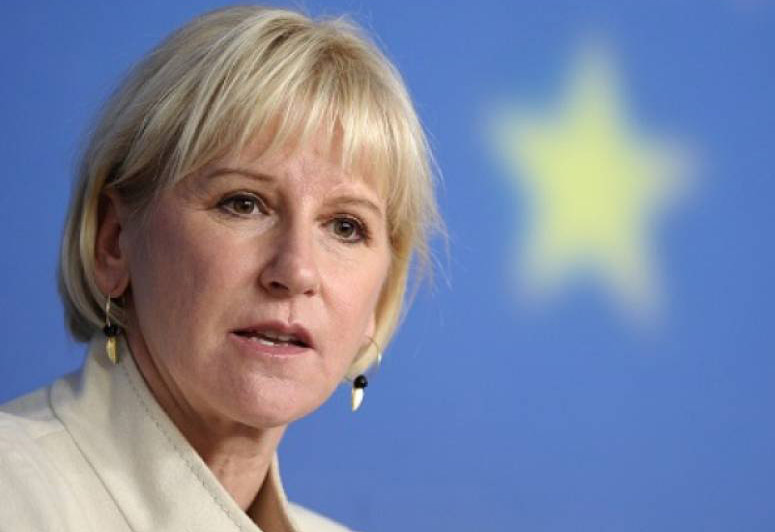Australia/Israel Review
Europa Europa: Wallström in Wonderland
Apr 29, 2015 | Douglas Davis

Douglas Davis
Why do bad things happen to good people? It is a question that confounds philosophers and theologians. Now politicians are being confronted with it, too.
First among them is Sweden’s Foreign Minister, Margot Wallström. Her good intentions have cost Sweden the good will of a large chunk of the Middle East, broken diplomatic ties and hundreds of millions of dollars in cancelled contracts.
Wallström’s undoing came when she visited Cairo to attend a meeting of the Arab League foreign ministers. She had been invited to address the gathering as guest of honour after Sweden, at her instigation, became the first Western European nation to recognise the Palestinian state. This was payback by the Arab world. She might also have counted it as political compensation for having been declared persona non grata in Jerusalem for her stand on the Palestinian state.
With jihadists rampaging across the region, she judged it appropriate to address the gathering on the subject of human rights in general and women’s rights in particular. Who could argue with that? Wallström was about to find out. The gevalt moment came when advance copies were discreetly circulated in advance of delivery. At the insistence of the Saudis, the speech was cancelled, the invitation to Wallström was withdrawn and she was unceremoniously bundled on to a plane back to Sweden.
The Arab League foreign ministers might not have had the opportunity to hear her words of wisdom, but the resilient Wallström refused to take “no” for an answer. A few days later, the speech-that-never-was appeared on the Swedish Foreign Ministry website. It was a textbook example of “ethical diplomacy”, but its effect carried a potent lesson for other European politicians who speak out boldly about human rights abuses for domestic consumption but usually tread far more sensitively when they are abroad.
Margot Wallström is no political neophyte. She felt she had earned the right to deploy Sweden’s reputation for moral clarity in the service of her country’s most cherished goal: the spread of human rights. It was a gamble that did not pay off. Not in terms of Sweden’s political, diplomatic or economic self-interest.
The ambassadors of Saudi Arabia and the United Arab Emirates were withdrawn from Stockholm, and there are fears that more will follow. Both the Arab League and the broader Organisation of Islamic Co-operation condemned her comments. Contracts worth hundreds of millions have been lost.
In Sweden itself, there have been howls of anguish from the business community about the longer-term economic consequences (Saudi Arabia has already issued a blanket ban on issuing new business visas for Swedes), and the former foreign minister, Carl Bildt, warned that thousands of Swedish jobs are in danger as a result of the fallout. Not least, it has dealt a hammer blow to Sweden’s diplomatic hopes of winning enough votes to secure a rotating seat on the UN Security Council.
Wallström’s blunder was compounded on her return to Stockholm, where she told the Swedish parliament that Saudi Arabia is a “dictatorship” which violates women’s rights and whips bloggers (a reference to Raif Badawi, who was sentenced to 1,000 lashes for allegedly “insulting Islam”).
This provoked an escalation from Arab foreign ministers, who denounced the remarks: “Arab countries” they thundered, “totally reject Wallström’s statement as irresponsible and unacceptable… Saudi Arabia’s Constitution is based on the Sharia [Islamic law] that protects the right of people and safeguards their blood, wealth and honour.” In Abu Dhabi, the United Arab Emirates Foreign Minister, Anwar Gargash, summoned the Swedish ambassador to declare that Wallström failed to “respect the religious and cultural particularities of states and communities”.
Those few words went to the heart of the matter. Despite Europe’s close engagement with the Middle East, it persistently fails to see what it wants to ignore. The UN Declaration of Human Rights is a well-known landmark in the West, but not many know that the Islamic world does, in fact, have its very own code of behaviour: the Cairo Declaration of Human Rights in Islam. The code was adopted by the Organisation of Islamic Co-operation in 1990 and relies on Sharia law for dispensing justice. It opens, for example, by “reaffirming the civilising and historical role of the Islamic Ummah which God made the best nation.”
Wallström was brave to have attempted to lecture the Arab League, however obliquely, on Europe’s perception of human rights. And she was brave to speak out on the depredations suffered by women in the region, including such medieval practices as female genital mutilation, honour killings, forced marriage, sex slavery and religiously sanctioned domestic violence.
Brave, perhaps, but unwise. The Saudis had laid an ambush and La Wallström walked into the trap. The lesson that the Arab world wanted to teach – and which it is prepared to vigorously reinforce – is that criticism of their system is not a cost-free exercise.
In due course, the pendulum will swing back. Normal relations will resume. In the meantime, however, European leaders will be far more guarded about offending Arab sensibilities in the Middle East. Much safer to stick to the relatively inexpensive business of kicking Israel.
Tags: Europe






